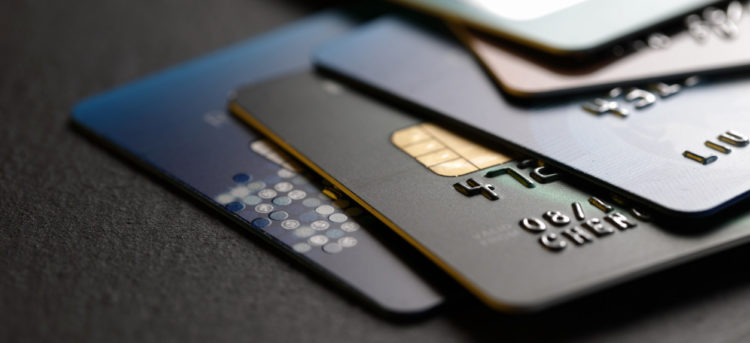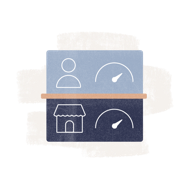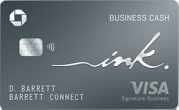Advertiser & Editorial Disclosure
If you are looking for a small business credit card, you’ll probably focus on the benefits and rewards you can earn, as well as the annual fee and interest rate you’ll pay. How that card will affect your credit scores probably won’t be top of mind, but it’s worth considering. Having business credit cards that do not report to personal credit can help your personal and business credit ratings. (See how your business credit cards are impacting your personal scores with a free Nav account.)
Will my business credit card activity affect my personal credit?
Most small business credit cards require the business owner/cardholder to personally guarantee the debt. That means that if the balance isn’t paid off through the business, the owner will be on the hook for the entire amount. That also means business account activity may spill over to the owner’s personal credit reports, depending on each card issuer’s policy.
Some card issuers only report activity to the cardholder’s personal credit reports if the owner defaults. Others will report all activity, whether it is positive or negative.
Pros and cons of business credit cards that do report activity
Which way is better? It depends on your situation. As long as you pay your business card on time and avoid high balances, having a business card that appears on your personal credit reports with Equifax, Experian and TransUnion should not be a problem, and may even help your credit scores.
But if you charge everything you can on your card to rack up rewards, for example, then your personal credit could suffer. Why? Credit scoring models take into account your “debt usage” or “utilization” ratio, which compares the balances reported against available credit limits, often for each card as well as all credit cards totalled together. A high balance on a business card that appears on an individual’s personal credit can mean a high debt usage ratio which can lower credit scores.
(Keep in mind that simply paying the balance off in full each month alone isn’t likely to solve this problem. The balance that is reported is usually the balance as of the statement closing date, not after a payment has been made. If you want lower balances to be reported, you need to make your payments before the statement closing date, or whatever date the issuer reports.)
On the other hand, if your personal credit history is a bit thin, a business card that reports your full account activity may help. For example, if you avoid credit cards and use a debit card, then you may have a “thin” credit profile that could benefit from the boost another card can help provide.
Choosing a business credit card that does not report to personal credit may be helpful if you know there will be times you need to run up charges that put you close to the limit or carry a balance — think holiday inventory, or that big tradeshow, for example — and you don’t want that activity to bring down your scores.
Following are the policies of the major business credit card issuers at a glance:
| Issuer | All Activity | Default/Negative |
| American Express | No | Yes |
| Bank of America | No | No |
| Capital One | Yes* | Yes |
| Chase | No | Yes |
| CitiBusiness | No | No |
| Discover | Yes | Yes |
| PNC | No | No |
| US Bank | No | No |
| Wells Fargo** | No | No |
*Capital One activity is flagged as ‘small business’ when reported to personal credit reports.
**Wells Fargo generally does not report negative information to the owner’s personal credit, but reserves the right to do so.
Check with your card issuer for updated information. Copyright 2020 Nav Technologies Inc.
Ultimately, you’ll have to decide whether having a business credit card that does or does not report monthly account activity on your credit reports is right for you. Either way, you’ll want to keep tabs on your personal and business credit scores, to make sure they are as strong as possible–and stay that way.
Ink Business Cash® Credit Card
This article was originally written on November 23, 2015 and updated on May 5, 2020.



Your article states that US Bank does not report business credit card activity to consumer credit reports. I called and spoke to two different representatives to confirm this info. They stated that they DO report to consumer credit reports. Where did you get this information, did you talk to US Bank directly? Can you please confirm why I received conflicting information?
I applied for US Bank card and accidentally hit the apply button prior to taking off my credit security lock . Not only was I not approved with 795 credit score with good overall credit history . It put an inquiry on my Experian report. Which I was trying to ignore.
This chart is very helpful.
What about Barclays Bank ??
Do they report to personal credit report???
My understanding is that they do not, though I have been unable to confirm that with the issuer. Still trying!
I have an LLC how do I get a business credit card
Diana, You can search for and apply for a business credit card here at Nav. Note the decision will largely be made based on your personal credit scores and income from all sources. If you have a Nav account you’ll also see MatchFactor for the business credit cards you’re interested in. Hope that is helpful!
Hi there.
I have had a business since 2001 and collected income for the business with retainers from various principals. . Over the past few years, many of these principals have slow paid me and I ended up having to take an actual job (as of a year ago). In the next two months, I will have very little money coming in and it will cease. I have amassed unfortunately $17K in debt on a business Credit card with Bank of America with some business investments that went south (yes, I know, but it was for what I thought to be a product with guranteed success-not). I have had to keep putting money into the business account to make payments on the card (about $300 a month just to make the min payment- it’s at about a 7 percent interest rate).
However; in addition to my real job, I do have a secondary gig going with health insurance where I am working the weekends. Last year, it netted me an extra $15K, but I am not sure what that will be in 2019 (could be alot more or even less depending on how some marketing pans out for the insurance types I work with).
I am wondering if I should modify my charter to have that income go into the business account (thus keeping the business open and be able to continue to use that business as non-reimbursed employee business expenses, home office, etc., – with my current main job as well as the deductions I can garner from that since you can’t claim non-reimbursed or work at home deductions anymore as of 2018.
Or do I just shut the business down and try and work something out with Bank of America? Also, would that affect my personal account if I do that? I have never had to haggle with a bank before to pay off a debt short of what is owed.
I don’t really know the best way to go…
Appreciate any advice as to this matter. Thanks
Lee Miller
Lee,
I’m sorry to hear things haven’t been going well for your business.
First, I would recommend you talk with a qualified tax professional about the income/expenses issue.
Second, with regard to your business credit card debt, you have likely signed a personal guarantee which means the issuer likely has the right to try to collect from personal assets if your business defaults on its debt. Issuers do negotiate settlements, however, so it’s possible you may be able to work out a settlement on that debt, allowing you to resolve it for less than the full balance.
Third, with regard to how this might affect your personal credit reports, the chart above will hopefully be helpful. Please keep in mind this is information we’ve received from the card issuers and may be subject to change.
Finally, do you think it would be helpful to get some outside perspective on your business situation? Free help is available from your local SCORE chapter or SBDC office. Use the SBA local assistance locator to find assistance in your area.
Hi Lee,
If you do determine that negotiating a lower pay off is best, major banks will often settle their business accounts in a similar manner to how they settle personal. You have to be late for their recovery policies to kick in, so you are likely looking at 5 months of being late in order to optimize savings when settling your credit card.
I have an established business with high revenues but brand new to building and establishing my business credit report. Do you have recommendations to secured business cards that report to business credit agencies but perhaps not to personal? I believe Wells Fargo does and BBVA does not report. Any others that you can suggest?
What about Barclay’s? You don’t mention whether they report new business accounts to personal credit bureaus.
I didn’t include them because they were not issuing business cards in the US at that time. They have introduced the JetBlue Business Card since then; will look into that one. Thanks!
Since this posting how does Barclay JetBlue card report?
Great question Ashley. I’m contacting them.
I know this is an old article but I do have a question. I had a “business” Costco credit card from AMEX that I would like to be reported to my personal credit. It is a very old account and I have kept a low balance and on time payments. Nothing else shows up on my report except my mortgage and some older closed accounts. I think it could raise my score as I have tried everything else and I am still in the “fair” range. Is there a way to “make” AMEX report it?
Great question! No, you can’t force an issuer to report, unfortunately. It does sound like you could benefit from a revolving account on your credit reports though. The only way to get an “aged” revolving history would be to have someone add you to one of their accounts as an authorized user. If they do, it’s likely the entire account history would be reported. But the next best option is to get a personal credit card and let that help round out your mix of credit and add some current activity to your reports. Hope that helps!
It does. Thank you. Just frustrated hat they will only report “the bad”. I would have changed my account type if I knew this information earlier. Live and learn I guess… Thanks again!